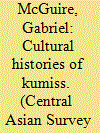|
|
|
Sort Order |
|
|
|
Items / Page
|
|
|
|
|
|
|
| Srl | Item |
| 1 |
ID:
156105


|
|
|
|
|
| Summary/Abstract |
In the nineteenth century, European doctors began to credit kumiss (fermented mare’s milk) for the apparent absence of tuberculosis among the nomads of the Eurasian steppe. As European and American medical journals published articles on the ‘kumiss cure’ and Russian doctors opened kumiss sanatoria, praise for the drink’s curative powers was wound together with romanticized images of the nomadic pastoralists whose creation it was. In Soviet and now in post-Soviet Kazakhstan, kumiss came to hold the double status of medicine and of national heritage. Yet if in the nineteenth century, the steppe was notable for the absence of tuberculosis, in the late twentieth century, it is notable for its presence: Kazakhstan, like many post-Soviet countries, is currently the site of an epidemic of drug-resistant tuberculosis. Discussions of the epidemic now tangle together concerns over the physical health of the population with concern over the cultural health of the body politic.
|
|
|
|
|
|
|
|
|
|
|
|
|
|
|
|
| 2 |
ID:
088076


|
|
|
|
|
| Publication |
2009.
|
| Summary/Abstract |
During the past ten years there has been an increased willingness by international
health organizations to include multisectoral nonstate actors
in their decisionmaking processes. The stated aim of expanding multisectoral
involvement is to increase information flows from those on the ground,
to create a sense of policy ownership by those implementing various health programs,
to create a more unified front against global health priorities, and to
create a more robust sense of institutional legitimacy. One such institution has
been the Global Fund to Fight AIDS, Tuberculosis and Malaria, which was designed
specifically to bring various stakeholders together to create a more coordinated
mechanism to combat three of the world's most destructive diseases.
The purpose of this essay is to discuss the role of nonstate actors in the
decisionmaking processes of the Global Fund. The aim of this discussion is
not to undermine the good work of the Global Fund, but to expose certain
structural weaknesses in the current way nonstate actors are incorporated into
the governance process and to illustrate how these structural processes might
negate their effective participation. By doing so, this exploration will help expose
various deficit gaps between the stated aims of multisectoral participation
within the Global Fund and its actual practice. The goal is to encourage normative
recommendations for increasing the real-world operation of stakeholder
inclusiveness, ownership, partnership, and participation within the Global Fund.
|
|
|
|
|
|
|
|
|
|
|
|
|
|
|
|
| 3 |
ID:
095620


|
|
|
|
|
| Publication |
2010.
|
| Summary/Abstract |
It is often argued that multilateralism is no longer an effective mechanism to respond to global priorities and that more deliberative and multisectoral governance is needed. To explore this, the purpose of this article is to examine the practice of mutlisectoral deliberation within the Global Fund to Fight AIDS, Tuberculosis and Malaria and to determine whether it has resulted in providing a more deliberative response to global health priorities. To do so, this article will apply various theoretical arguments for deliberative democracy to the results of a four year study on the multisectoral organisation the Global Fund. By making links between theory and practice, the article will argue that the multisectoralism practiced by the Global Fund continues to suffer from a deliberative deficit and that it has not safeguarded equal stakeholder participation, equal deliberation between stakeholders or alleviate the asymmetric power relationships which are representative of current forms of multilateral governance. Nevertheless, by locating these gaps between theory and practice, it is possible to outline deliberative safeguards that might, if constitutionally enhanced, pull the Global Fund closer to its own normative values of multisectoral deliberative decision-making.
|
|
|
|
|
|
|
|
|
|
|
|
|
|
|
|
|
|
|
|
|